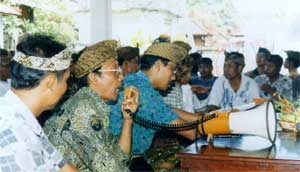Banjar Plenary Session
DENPASAR (indo.com): Galungan and Kuningan mark important
festival days for Balinese Hindus, with abundant food,
fruit and new clothes for kids and ceremonies for adults.
It is pretty much the Hindu equivalent of Christmas.
One aspect which is less celebratory, but also highly
inportant, is that it is also time for the village members
to conduct a grand plenary session to evaluate what they
have done in the past six months and what they are going
to do in the next six. The festive days occur every six
months according to the Balinese pawukon calendar, in
which each month consists of 35 days.
 There
will be many banjar meetings during this period of time,
especially when local Balinese hold incidental ceremonies
such as cremations, family bazaars or make special offerings
to placate evil spirits when something bad happens in
the village. There
will be many banjar meetings during this period of time,
especially when local Balinese hold incidental ceremonies
such as cremations, family bazaars or make special offerings
to placate evil spirits when something bad happens in
the village.
The annual meeting, which takes place before or between
Galungan and Kuningan, is treated as special since it
is a time to evaluate whether or not the previous plan
had been successful.
Just as with the American system where a President has
to make a progress report to the senate members, the banjar
meeting follows a similar pattern. Members of the banjar
(all the married men within a village), listen attentively
to the progress report made by the banjar chief and his
ministers.
Questions are asked about any issues of particular concern
or things about which the banjar members are unhappy.
If too many people are not satisfied, they might vote
for an impeachment. In addition, Balinese people have
an unwavering belief in karma, with good conduct resulting
in good feedback and vice versa.
This is one reason why people will insist on going to
their own villages and hometowns between Galungan and
Kuningan Day, separated only by ten days. They are strictly
required among (other things) to attend the plenary meeting.
The meeting will also decide the master plan for the banjar's
activity for the next six months or more.
This may include the renovation or development of the
village temple, other construction such as bridges, roads,
schools, or any other community project. In well developed
tourist or commercial towns such as Nusa Dua, Denpasar,
and Kuta, discussion also includes drug abuse, illegal
migrants and of course the tourism industry.
While people often credit the Western world with the
development of various forms of democracy, it is interesting
to note that the Balinese have also applied a form of
democracy in their traditional banjar system for a similar
length of time as the Western world.
|






 There
will be many banjar meetings during this period of time,
especially when local Balinese hold incidental ceremonies
such as cremations, family bazaars or make special offerings
to placate evil spirits when something bad happens in
the village.
There
will be many banjar meetings during this period of time,
especially when local Balinese hold incidental ceremonies
such as cremations, family bazaars or make special offerings
to placate evil spirits when something bad happens in
the village.